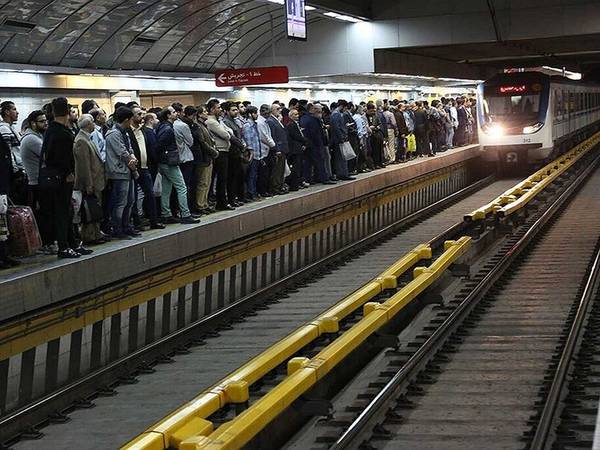The escalators do not work. What works here is hijab enforcement. Welcome to Sadeqieh subway station in western Tehran! A link between the rest of the Iranian capital and its nearest densely populated suburb Karaj.
The loudspeaker says the next train to downtown Tehran does not stop here as it is fully packed. In less than a minute, passengers are forced to step back from the edge of the platform and watch a train with its doors open dashing away in high speed as passengers inside cling onto whatever that can help keep them on board. A subway train with doors malfunctioning is another sign of breakdown in public services.
The Kayhan newspaper, a hardline daily associated with the office of Supreme Leader Ali Khamenei, recently suggested that US President-elect Donald Trump should be assassinated, claiming that this would please Allah. Such statements are profoundly unacceptable by any standard. Yet, the government, which maintains tight control over domestic media, allows this newspaper to make threats against a foreign elected official.
The "reformist" press adopts a slightly more moderate tone. Etemad newspaper reported that 12 economists have advised President Masoud Pezeshkian to address the shortage of electricity and fuel by raising prices, suggesting that higher costs will lead to reduced demand. The suggestion comes as 40% annual inflation has impoverished one third of the population in the past five years.
Outside the station, traffic police stop women riding motorcycles. A 16th-century cleric, Mohammad Bagher Majlesi, known as Allamah, or “the most learned man” in Isfahan, issued a ruling in his interpretation of Shariah law that women should not sit on saddles, claiming they might experience unchaste sensations from the contact with the saddle. Confiscated motorcycles line the sidewalk, awaiting a male family member to come and collect them.
For many men and women, motorcycles are the most practical way to navigate Tehran’s heavy traffic. Women are allowed to ride as passengers, and Shariah law generally overlooks it when they hold onto the male driver’s waist for support. There are different rules for the driver’s seat and the passenger seat, as if there were two different Gods governing each position.
The government attempts to strictly enforce hijab regulations, at times using force, though many women continue to resist. The latest enforcement initiative is the Hijab Clinic, also called the “Clinic to Give Up Hijablessness.” The wording gives it the tone of a center for drug rehabilitation. An Iranian journalist commented on X: “This political system clings to absurd measures while grappling with multiple crises. Such a system is bound for decline; power, water, and gas shortages, along with the opening of hijab clinics, are signs of its collapse.”
Despite the government's strict stance on hijab, two of the most widely shared stories on social media this year involve scandals surrounding state officials and celebrities. While authorities say they made a few arrests in Rasht, related to a sex scandal caught on video, they have remained silent about another incriminating video involving the granddaughter of a Friday prayers Imam in a different city.
The government has attributed widespread power outages to its decision to halt the use of polluting fuels in power plants, yet residents continue to complain about the smog that settles over the city like a thick blanket. It was only after mounting criticism that Government Spokesperson Fatemeh Mohajerani acknowledged that some power plants are still burning mazut, one of the most harmful fuels available. An energy expert reports that Iran burned approximately 8.2 billion liters of mazut in urban areas last year. The reason: shortage of natural gas, when Iran has the world’s second-largest reserves.
Amid widespread public frustration over government inefficiency, viral photos have surfaced of five “apple polishers,” including two movie stars, a footballer, a TV presenter, and a wrestling coach, who continue to praise the government’s “achievements” in trivial areas or even compliment the President’s mannerisms. This seems to be a public tactic for naming and shaming those who turn a blind eye to the struggles of ordinary people.
Speaking of naming and shaming, one of the biggest stories circulating involves a whistleblower revealing financial corruption among several former officials, including two former heads of the Iranian Judiciary. Social media users have criticized state-controlled media for selectively covering these cases while omitting others implicated in significant corruption scandals, such as former Tehran mayors Mohammad Bagher Ghalibaf and Alireza Zakani, as well as the city's Friday prayer Imam, Kazem Sedighi.
It is these paradoxes and hypocrisies—scandals in a political system that prides itself on chastity, financial corruption in the world’s most prominent theocracy, and a ban on love and alcohol in a land whose literary heritage celebrates both—that led one of Iran’s most renowned contemporary poets, Ahmad Shamlou, to write: “These are strange days, my darling. They flag love at the crossroads, and they smell your mouth at checkpoints to make sure you have not said: I love you.”
